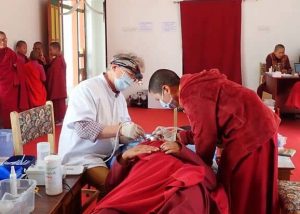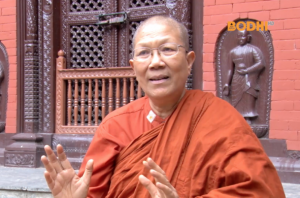
Social values in Vietnam are waning due to materialistic lifestyles and the faith of the people has been shaken because of widespread corruption among political and spiritual leaders. Consequently, the rise to public attention of the Buddhist renunciate Thich Minh Tue has had an enormous social effect on spiritual beliefs and has served to inspire many disillusioned people.
Millions of Vietnamese people, regardless of religion and social class, have followed the master’s every step on social media, an unprecedented social network interaction in Vietnam. Wherever Thich Minh Tue has traveled across the nation, he has received a warm welcome from tens of thousands of residents, who gathered to pay their respects. Domestic and overseas monks and Buddhist laypeople have joined this unofficial sangha. The elderly and the sick hope to encounter him in person, considering it a once-in-a-lifetime opportunity.
Thich Minh Tue has walked barefoot from the south to the north of Vietnam and back for six years to practice dhutaguna (Skt. austerities or ascetic practices), which include consuming a single meal of alms each day before noon, sleeping sitting in forests or cemeteries, and renouncing all material possessions. The master’s fourth circuit of the nation earlier this year became an unprecedented internet phenomenon due to massive attention on social media, overshadowing national political events and even celebrity gossip.
Hundreds of TikTokers and YouTubers trailed him night and day, streaming live to millions of eager viewers. A Facebook group for Thich Minh Tue’s fans was created with tens of thousands of members joining daily to share information and Dharma teachings. People who were formerly brash and unruly began speaking politely and behave more gently. Surely this is a worthy example of social transformation?
Some people went as far as using Thich Minh Tue’s image on social media to increase engagement for online business, with e-commerce platforms and social networks seeking to market clothes and accessories designed to mimic the colors of Thich Minh Tue’s own attire.
Prominent intellectuals and artists were vocal in expressing opinions about this barefoot monk. World-famous mathematician Ngo Bao Chau confessed that he adored and respected Thich Minh Tue, writing: “The crowd trailing the monk [are] probably not simply motivated by social media but perhaps, like me, believes that this is a true master.”
The chairman of the Vietnam Writers Association, Nguyen Quang Thieu, exclaimed in a widely read social media post:
People exalt him, and he still goes.
People curse him, and he still goes.
People sprinkle flowers, and he keeps walking.
People scatter nails, and he also keeps walking.
And people continue to live as they have lived in the world for thousands of years: eating, sleeping, cursing, fighting, killing, betraying, cheating.

Poet Do Trung Quan followed Thich Minh Tue’s every step, praising and defending him when the official Vietnam Buddhist Sangha issued a document warning the public that this humble monk was not a true monk. Trung Quan asserted: “In the past, Prince Siddhartha did not need anyone to grant him a license to become a monk. The Buddha also wandered, without a home or a temple, and ate whatever he was given.”
The chairman of the People’s Committee of Quang Tri Province, a region famous as the ground for fierce battles in former, less peaceful times, personally came to offer his greetings when the monk’s bare feet trod on this blood-stained land.
In a sermon to his followers, the Christian priest Pham Quang Hong from Australia spoke of the spiritual reward that Thich Minh Tue received due to his earnest devotion.
Father Giuse Pham Quoc Van questioned his parishioners about what made the monk so widely respected, explaining that it was due to deep spiritual aspiration: the people had found a true master, for whom they had long been seeking; Thich Minh Tue had given up everything to gain all.
RFA journalist Mac Lam explained that the reason why millions of Vietnamese had so admired and worshipped Thich Minh Tue was because of the stark contrast between the misconducts and luxurious lifestyles of many monks of the Vietnam Buddhist Sangha, and the simplicity and purity of Thich Minh Tue’s renunciation.
Thich Minh Tue had formerly practiced at a temple but encountered too many difficulties and distractions on the path to attaining liberation amid so many attachments. So he left.
It is common knowledge that a number of renowned monks in Vietnam have given teachings that go against the Buddhist Dharma, and taking advantage of the faith of lay Buddhists to accumulate money. Their practice of going on alms rounds is more of a performance than a sincere practice. When one venerable found people admiring the patched-robed Thich Minh Tue, he could not restrain his ire, calling Thich Minh Tue a villain, and accusing those who supported the humble monk of holding wrong views. This envious monk did not foresee the extreme fury of millions of netizens that his words would subsequently ignite.
A psychotherapist can only help one individual, one family, or perhaps a small group. Yet, without saying much at all, this patch-robed monk Thich Minh Tue has been instrumental in healing the traumas of millions of torn souls. What a miracle!
Many husbands, wives, and children have been inspired to become kinder and nicer. Those who are easily discouraged have become more resilient after reflecting on their difficulties and challenges in comparison to the much greater obstacles that Master Minh Tue has overcome. Many people who had followed him disclosed that, through practice, they had learned to appreciate every drop of water and every grain of rice; each soft breeze or cooling shadow of a tree. Because of their hectic modern lives, people become indifferent and fail to enjoy the gifts of the present moment. Through his example, Thich Minh Tue has reminded us all to enjoy and appreciate what we have.

The therapist seeks to help others by changing their thinking to be more accurate and positive. Thich Minh Tue, through the actions of a true Buddhist practitioner, has helped many people understand Right View and Right Thought. His way of facing and overcoming suffering has conveyed a positive message to so many people. Under the baking hot sun and burning winds of Quang Tri Province, on days when the temperature reached 40 degrees Celsius, Thich Minh Tue could be seen walking barefoot and hatless among the sweltering crowds, all the while abiding in equanimity.
The therapist also seeks to help change actions and conduct. Thich Minh Tue’s commitment to observing the precepts and overcoming adversity has inspired many to follow in his stead. When thoughts and behaviors shift in a positive direction, trauma is healed. Human endurance is mammoth if one does not give up prematurely. Through determination, commitment, and confidence we can overcome our limitations.
Actress Tina Tinh, a lay Buddhist, shared on her YouTube channel that the monk was a flesh-and-blood testimony to the practice of enlightenment. The monk’s actions, she said, had brought her unprecedented emotional relief and reinforced her faith. Previously, people had only offered recipes for making a cake, she proposed, while Thich Minh Tue was the first to bake a complete cake so that followers could see for themselves what it could be.
Some people think that YouTubers, TikTokers, and Facebookers have been following Thich Minh Tue’s pilgrimage for the sake of views, but Tina Tinh offered a different perspective: mainstream and social media have been reporting an excess of negative news for too long, so we should be grateful for the stream of positive and healthy information that this wandering monk has inspired.
In answer to the question of what Thich Minh Tue has contributed to society, Dr. Vu The Dung, founder of the online learning platform Thinking School, gave a convincing presentation on his YouTube channel. Dr. Vu believes that Thich Minh Tue’s social contribution is invaluable, and that the monk is a powerful and inspiring example embodying the Buddha’s teachings. Thich Minh Tue is the living Dharma demonstrating that the more you let go, the freer you become. When one renounces everything, all that remains is nirvana. His calm walking journey has moved millions of hearts, helping to restore faith in Buddhism and life. His image has gone beyond the scope of religion and helped to unite the Vietnamese people.
An article published by BBC Vietnam also noted the recognition that Thich Minh Tue has earned across social media. His patchwork robe, fashioned from discarded fabric scraps collected during his travels, and the rice cooker pot that he uses as an alms bowl, have become priceless embodiments of spirituality for people of all faiths. The appearance of Thich Minh Tue has created a period of spiritual “renaissance” in Vietnam and has been the inspiration for artistic expression in countless forms: poetry, music, sculpture, painting, and even fashion. This is a good omen for the Vietnamese people, who have experienced so much trauma and loss. Thich Minh Tue is a new wind blowing through Vietnamese society—a society that has become morally corrupt and that has lost faith in Buddhism. Thich Minh Tue is the right therapist at the right time for the Vietnamese people.

Related features from BDG
Buddhistdoor View: Mending Old Wounds – US and Vietnam Seek Friendship in a Complex World
Related news reports from BDG
Thich Minh Tue, Buddhist Ascetic in Vietnam, Ends Travels after Follower’s Death
Thich Minh Tue, Wandering Buddhist Ascetic in Vietnam, Gains a Following
Supreme Patriarch of Vietnam’s Buddhist Sangha Dies at 105













